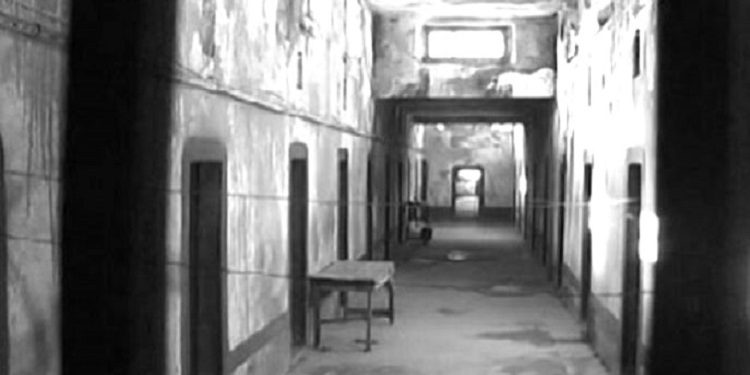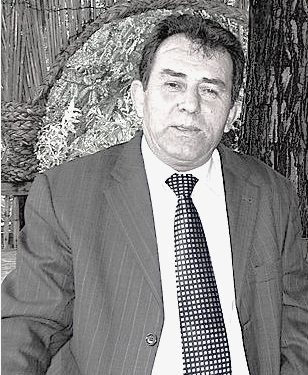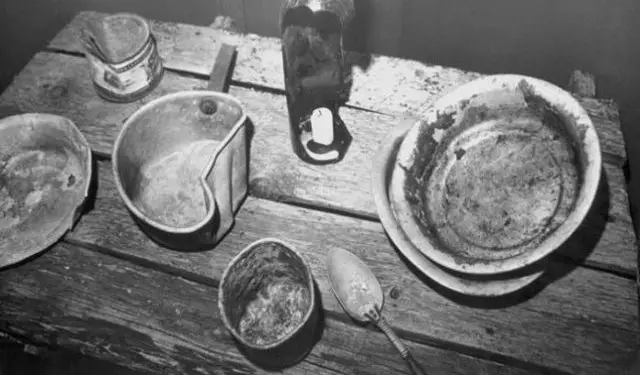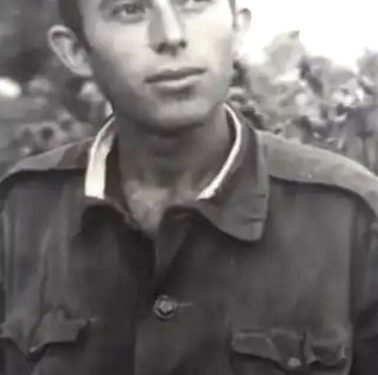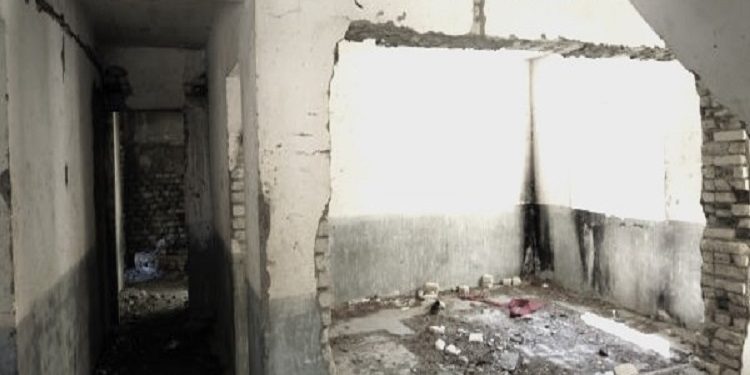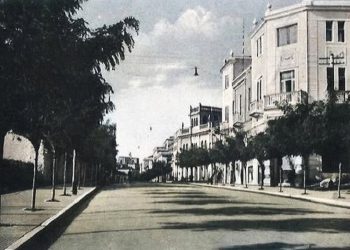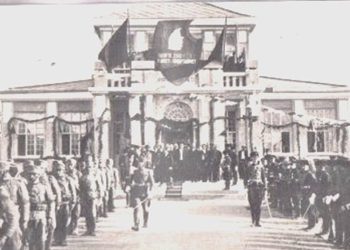By Shkëlqim Abazi
Part fifty-six
Memorie.al / I were born on 23. 12. 1951, in the black month, of the time of mourning, under the blackest communist regime. On September 23, 1968, the sadistic chief investigator, Llambi Gegeni, the ignorant investigator Shyqyri Çoku, and the cruel prosecutor, Thoma Tutulani, butchered me at the Branch of Internal Affairs in Shkodër, split my head open, blinded one of my eyes, deafened one of my ears, after breaking several of my ribs, half of my molars and the thumb of my left hand. On October 23, 1968, they took me to court, where the wretched Faik Minarolli gave me a ten-year sentence for political imprisonment. After half of my sentence was cut, because I was still a minor, sixteen years old, on November 23, 1968, they sent me to the political camp of Rrëshen (Reps) and from there, on September 23, 1970, to the Spaç camp, where on May 23, 1973, in the revolt of the political prisoners, four martyrs were sentenced to death and executed by firing squad; Pal Zefi, Skënder Daja, Hajri Pashaj and Dervish Bejko.
On June 23, 2013, the Democratic Party lost the elections, a perfectly normal process in the democracy we aspire to. But on October 23, 2013, the General Director of the “Rilindase” (Renaissance) Government, issued order No. 2203, dated 23.10.2013, for: Releasing a police employee from duty. So Divine Providence was intertwined with the neo-communist “Rilindase” Providence, and precisely on the 23rd, I was replaced by, no less and no more, the former Security operative of Burrel Prison. What could be more significant than that?! The former political prisoner is replaced by the former persecutor!
The Author
SHKËLQIM ABAZI
Continued from the previous issue
RREPS
(Forced Labor Camp)
Memoirs
The first meeting
(The boat sunk in the trough)
“My efforts and those who came to my aid were in vain. When we removed the noose, Luti’s eyes had set once and for all. The warm corpse convulsed on the floor, with his head hanging to the side and his tongue out, while the stream of blood flowing from the tip of his tongue fell warm onto the stone slabs of the entryway, creating a black, viscous pool. The vertebrae of his neck were severed; they couldn’t support the weight of his head. That unyielding man, who had overcome many hardships, after thousands of bullets from Italian, German, and partisan enemies had whistled over his head without him batting an eyelid, was defeated by a thin steel noose; he had given up the ghost!
The mere idea that the torture could be repeated terrified him. His pure soul could not bear the heavy burden of shame; being a spy was not cut out for him. He chose oblivion, leaving this mundane world, without yet being stained with the seal of crime. He chose self-sacrifice with the shirt on his back, which he had torn into shreds. The English fabric happened to be new and strong enough to bear all that weight. In the years of democracy, a nephew of his came to ask, because I remained the only survivor of that ordeal. I told him what I knew, but I could not guide him to find the remains. No one knows which pit he ended up in! May he find peace!”
This was Bajram’s story, as painful as it was unbelievable. The same event, with even more tragic notes, was later recounted to me by Muhamet Hoxha, or the Gjirokastra “DIVERSANT” (saboteur), as we all called him, the comrade in ideals and exile of the unfortunate man from Vlora. I am a witness to the other shocking and terrifyingly cruel event. It must have been around the second half of October 1968; I don’t recall the date, but the rare fact that I suddenly found myself in front of a disfigured body, covered head to toe in blood, is etched in my memory, as the most terrifying massacre my eyes had ever seen until then.
It was the last day of the investigation, as the trio of investigators told me. They had confined me in the middle of the office on a cemented metal chair, while three men were milling around. Standing was the chief investigator, Llambi Gegeni, with some papers in his hand; to the right, sitting, was the prosecutor Thoma Tutulani and another elderly investigator; an idiot whom I saw for the first time, who occasionally moved nervously behind my shoulders and cursed and yelled loudly whenever the others paused. As I would later learn, his name was Shyqyri Çoku. – “We have reached the final act!” – one of them told me. Except that to seal the “success,” they needed one more “tiny formality,” meaning a “tiny signature,” as Llambi liked to joke, and I, not because I was brave and wouldn’t give that “tiny signature,” but imagine; a child my age? I had bookish concepts about the law; I believed that: “If you don’t sign, they can’t do anything to you! They can’t convict you, even if you have murdered!” Let alone me, who couldn’t kill a fly!
Immersed in these archaic romanticisms, I decided not to sign. But the consequences would be fatal: the thumb of my left hand, broken out of spite, which even today moves freely when turned, as well as a sturdy stick, which left me a souvenir of about fifteen centimeters above my forehead, one blind eye, and one half-deaf ear. Anyway…! Since I was not some important case, they didn’t prolong it much. They gave me the lesson of the moment; Llambi broke my thumb, Shyqi split my forehead, while the prosecutor, as a well-wisher and a fellow patriot from Berat, supposedly pitying me, intervened: – “I feel so bad! But you are causing yourself great harm! Man, whether you sign or not, we have cut the suit for you, a ten-year sentence with a star!”
It seems the trio had prearranged everything. He lowered his eyes, swollen like a frog’s belly, onto the papers, raised them again, and from under his thick glasses, he gave me a crooked look, then added: – “But this time you’ll get away with it! You have half the sentence!” – He blinked his puffy eyes, then: – “But it doesn’t matter, the tenant and the innkeeper will meet; next time I’ll catch you good!” – “How can you convict me when I haven’t done anything!” – I interrupted him. – “Why, man, do you think we are fools, so we can let your lordship do it, and then convict you? Here, man! We know what you’re brewing in that enemy head of yours, and we’re cutting the bridges before the fire falls! We’ll give you a ten-year sentence, and afterward, we’ll see what we do!”
– “You are not a court to convict people! Only they have the right to convict, but not without facts!” – I interrupted him again. – “Oh comrades! Look at what a rebel my boy is! How is it, didn’t you know that courts are just rags for us to wipe our shoes with?” – When he noticed my surprise, he added: – “Well, you’ll see for yourself!” – Thomai finished and his round belly heaved with laughter. He had been right! They had indeed cut the suit for me! I had been a naive fool for believing in the justice of the socialist courts! If I had known back then what I would learn later, I would have saved myself many unnecessary troubles, but above all, I would not have been mutilated. But, let’s get back on track.
The stubbornness of a fool annoyed the investigators greatly, so they didn’t prolong it, but closed the file quickly and gave the order to two police officers: – “Take him, take him to the cell! But first, take him to the spot once!” Because my legs were trembling like reeds and wouldn’t obey me, the police officers dragged me, took me to the faucet, and dumped me in the basin. Apparently, by the term “the spot,” they meant the faucet. They removed my handcuffs, called the cell block supervisor, Jonuz, and left. Blood had caked my head and body; it had run from the cut on my forehead and dried on my face and tattered clothes.
I threw some handfuls of water. And what do I see? The basin turned red. The cut on my forehead seemed to have opened up because the wound was scorching me. Blood started to flow. Jonuzi, a little further away, was petting the kittens: “meow-meow, meow-meow”! As soon as he noticed the reddened water, he left them and turned to me, surprised: – “Hey patriot, did they beat you up today?” – He approached, grabbed me under the chin, and lifted my head up. – “Hold it like this, for the blood to stop!” – He ordered. It seems at that moment he noticed the cut on my forehead, because he burst out: – “Woah-aah, they mutilated you, man!” He lowered my head again onto the concrete sink; the blood continued to flow. – “You had all that blood, man!” – He added, seeing it still dripping. – “Oh dear, they made salad out of you, like that poor soul here! Why, did you save it all for today? Man, oh man!” When I heard that someone else was in my predicament, I turned my gaze towards where Jonuzi was pointing. I froze. What do I see!
A creature without contours, which could have been any kind of slaughtered animal, except a human body, was dumped at the base of the tree trunk! A mutilated body, covered head to toe in blood, so much so that you couldn’t tell what color the clothes must have been before. Around this shapeless mass, a pool of blood was dark, which had just begun to clot. A hive of giant flies buzzed around the formless mass, and millions of slimy larvae crawled over the blood clot. I couldn’t tell if he was tied up or if they had thrown him as the moment had struck. He didn’t move; he didn’t show any sign of life. He seemed completely lost. But meanwhile, something like a muscle twitched in the upper part, which was unclear whether it was the back or the belly, because this whole being had been reduced to a pile of flesh. – “He must still be alive,” and I turned to Jonuzi: “Mr. Jonuz, please, do something!” – “May they take you in the throat, may they take you! What can I do for this poor wretch, man? May God only help him to take his soul away an hour sooner?” “Pity!” – I forgot my own wound at that moment. “Oh yes, man! Look at yourself! The German is finished, man!” He took me by the arm and returned me to the cell.
Then he left, but quickly returned with a first aid box. He washed my forehead with a wad of wet cotton, rubbed it with iodine, and then wrapped a bandage around my head like a turban. While acting as a nurse, he accompanied every action with a song, like a mourner: “Ah, man, river and stream, woe to you, what found me! Oii-oiii. What did you become like this? Oh lamb, oh wooden-head! Oii-oiii. Woe to me for this boy, what a mark you got on your forehead! Oii, oiii! You crow, oh gentle boy, you were left with one ear and eye. Oii, oiii.” Jonuzi, the veteran police officer of Shkodra’s cells, was the fiercest and one of the most scrupulous on duty. But with me, I don’t know what happened to him! Maybe because of his age, his heart had softened, which is why he was being gentle? Only God knows? But he didn’t believe in God! Then what could have happened?!
Maybe as a man from Berat, in a foreign place, he helped me! In any case, I will never forget what he did for me during those days of misery. I will dedicate a separate chapter to him and others like him. When they took us out to the bathroom, late in the afternoon, I didn’t see the bloodied man at “the spot” anymore. I prayed to God that they had taken him to the hospital and he had been saved! But…! Oh God! The next morning, Jonuzi dashed all my hopes: – “That poor wretch died! He couldn’t last two hours! But, he was a stubborn mule who…”! I never learned who this “stubborn mule” was, where he was from, or what he might have done! But that chilling sight, even today after forty-odd years, does not leave my mind; it follows me like a phantom, just as I fixed it, for the last time.
In both cases, the conclusion is death! And what does it matter if it was suicide or being left to die! They valued the individual less than a dog! Another case was deaths caused by fellow sufferers. Naturally, these were also classified as violent, but nevertheless, the real perpetrators of these tragedies came out onto the path and warmed their hands in the fire of blood feud that they themselves ignited. Living within narrow confines, with actions conditioned by the articles of regulations, forced co-existence in a group even with undesirable types, whom in freedom one would not agree to even exchange a good morning with. Many psychopaths and anti-social individuals, with pronounced mental problems and deformed characters, with opposing political beliefs, or obscurantist fanatics, found it difficult, if not impossible, to share the same space.
In conditions of isolation, these types became even more unbearable, and even very aggressive. These negative qualities were exploited by the operatives and the command, which, with the most diabolical methods, sowed hatred and incited enmities among the prisoners. It was not at all difficult for a cause, however trivial it seemed, to generate dissatisfaction in prison. A momentary disagreement could degenerate into violence. A crooked look, an ambiguous word, a tasteless joke, a harmless gesture, an elbow touch on the lineup square, an action or inaction at the right time, turned into trouble. Quarrels broke out over lines: not mine, not yours, not the line at the barber’s, not the line at the bathrooms, not the line at the showers, not the line at the private kitchen, not the line at the soup cauldron, etc., because life there was a line!
Then also about lineage: I am so-and-so, you are so-and-so, I am Gheg, and you are Tosk, you told me, and I said, etc., because there, the ego reached its peak! Above all disagreements, the cynical ones picked through them like chickens pick millet; they scattered them like the farmer scatters wheat kernels in the field; they organized them like card players organize cards; they sifted them like the housewife sifts flour; they turned them back and forth and put them under a magnifying glass. Then they processed them in the trough of gossip, from where they took them out burning hot as from the furnace of hell and served them to the resentful ones, to be scalded.
There were always lazy people and opportunists, prone to baseness, perverse hooligans, who wallowed in the dough of intrigues, with bran flour; just like those crooked-beaked witches from ancient tales, who contaminated the cut hair of the pig with cat claws and fabricated the behind-the-scenes plots that in normal conditions, no modern fantasist, however wicked, would be able to concoct. That was enough to start the next revenge, which sometimes crossed the barbed wire fences and with hellish speed, were transferred from one camp to another, and even outside the prison city, to the families of the unfortunate, in their hometowns or even in internment places. Consequently, many of them fled with the clothes on their backs or locked themselves in their homes. It happened that entire families were confined. This deadly phenomenon, typical especially for the Northerners, but which did not exclude the Southerners either, physically, morally, and psychologically destroyed dozens of “great” men.
Operatives vigilated like black ravens over carrion; they caught, processed, and stimulated every momentary quarrel, however insignificant it seemed. Then they fanned the fire of hatred, which increased aggression among the prisoners, as an effective method to more easily control the enemies of the regime. Special Security operatives, disguised in the clothes of the internal service police officer but, sometimes even in the brown clothes of the political prisoner, performed specific duties in the field, following and observing “problematic” individuals. They often managed to penetrate deep into the subject, study the character of the person targeted for victim or executioner, pick out every word, every gesture, so that they could then intervene supposedly in the name of the law, or in defense of the life of the threatened person.
But the primary goal was neither life safety nor the extinguishing of the conflict. On the contrary. By infiltrating personal conflicts, they aimed to achieve two fundamental goals; first, they exploited the opportunity to increase the ranks of their collaborators, and second: they incited enmity. By adding fuel to the fire of hatred within the same group, distrust between the “enemies” of the Party naturally increased, and as a result, the seed of division sprouted, and resentment grew. They targeted individuals with good names, discredited them, shamed them before the council to make them lower their heads. Men with high moral and political values, prominent nationalists, unyielding opponents of communism, who had not surrendered before many, many difficulties, who enjoyed indisputable integrity; they should not leave prison alive.
By any means and in any way, they concocted dirty affairs for them, to bring them under the clutches of enmity. The case I will tell happened almost a year before I arrived, but it was talked about everywhere as if it had happened yesterday. It was about Ali Maliqi, the man who became an emblem of political prisons. Ali Maliqi was a descendant of the distinguished Agolli “hearth,” known in Dibra and beyond for patriotism, wisdom, and bravery. This family had always produced men of word and gun. Forged and tempered in the anvil of the “room council,” where young people were educated and taught that: “the word kills more severely than the bullet” and that: “to pull the trigger of the gun, you must sharpen two pens first!” Ali was a product of this environment.
From his youth, his special intellectual abilities and strong patriotic feelings stood out. Ali was fond of the corner, his wise words stuck like glue, so in the “nine mountains of Dibra” they honored and respected him. This man of faith was heard everywhere; the elders of the area followed him. Thanks to his extraordinary organizational skills, he wisely and bravely led the people in the fight against the invaders. However, the Dibra communists, the Lleshajs, the Xhuglins, and some hypocritical pseudo-clergymen, who prayed during the day and kissed at night, the Philistines (like Baba Fajë Martaneshi, who, in fact, had been given the nickname in vain, as he was “Dylber Kavaje”), did not appreciate this fame. Thus, sometimes secretly, sometimes openly, they opposed him with intrigues that melted like salt in water, because, among the people, Ali’s influence grew more and more every day.
They tried to lure him with insignias; they promised him power. They tried everything and anything! But the roads had parted; the language of compromise was not found. When they saw that the attempts failed, they started the backstage game. Nevertheless, with the foresight that characterized him, he still tried to avoid bloodshed among brothers of the same race. And he succeeded. The pacifist policy he preached enraged the communists even more, who, upon seizing power, would target him as one of the first to be arrested. They fabricated political charges and convicted him for a long time as anti-Albanian, even though in Dibra he was respected as a pure nationalist.
His ordeal began early in the Tirana prison; he was transferred to the reeds of Vloçisht and to the Maliq lake, to the Vlashuk and Beden canals, to the Thumana swamp, and successively: to the Burrel prison, to the first and second Laç camps, to Rubik, to Fushë Krujë, and finally, to the cement factory in Elbasan. He had completed nearly twenty-five years in prison, and only a few months separated him from the day of his release. He rejoiced at the fact, not because he hoped something major would change in his daily life; his whole family lived in internment, in the swamps of Myzeqe, but the mere possibility that he was reaching old age in their home affected him.
But the Security did not want Ali’s release. His flawless figure, the reputation he still enjoyed, especially among his region’s people, frightened them. They wouldn’t hesitate to convict him for a second and third time; they could find two false witnesses, from the mold of the cell mice, whenever they wanted, give him a ten-year sentence, and if he was long-lived, another ten-year sentence, until he died in prison, and the chapter was closed. But they had reserved an even sadder end for him: to eliminate him physically, to eliminate him morally, and to sow a long and endless enmity between two families. They achieved this through the gears of the gossip machine.
They set in motion the internal agent network; through unscrupulous intriguers, they staged a non-existent affair, spreading words that were never said. They finally found a wretched man who, after processing him, incited in him the feeling of primitive vengeful hatred. By hurting the sick pride of Lazam Shota, they steered him according to their wishes. The “masters” who meticulously prepared the crime scene managed to confront the two “enemies,” alone, in a hearth-tower. While Ali set off as usual, to the front where he was assigned to work, with a pickaxe and mattock in hand, to design the reinforcement in the chimney, completely innocent of the fate the gods had ordained for him; Lazam, on the other hand, was armed with an iron lever, placed in ambush on top of the tower, spiritually prepared for the tragedy that had been prearranged and that he had been charged to carry out.
This pitch-black soul, instructed perfectly, struck the poor old man several times on the head. To ensure that he fulfilled the deed with complete success, he also delivered the fatal blow; he threw him to the ground from the height. He savagely mutilated the old man! When he was convinced that he had accomplished his mission, he surrendered, in good faith, to the command representatives, those who, to guarantee his life from Ali Maliqi’s friends, sent him to the cells of the Branch of Internal Affairs in Elbasan. Almost everyone was convinced of the existence of a prior agreement between the executioner and the Security. The analysis of the synchronized actions is enough to erase any shadow of a doubt. Thus, the final goal was the physical elimination of the distinguished nationalist and leaving the rope dragging behind his death.
The very fact that the executioner, upon committing the crime, surrendered, and was secured by the police, proves the skeptics right about the coordination of actions. So, there was a preliminary agreement, more than perfect. I believe this needs no commentary! When I arrived in Rrëshen (Reps), I heard many fellow sufferers who had been witnesses at or near the scene, talking about this ugly crime, each in a different version. Since this pitch-black crime left a bitter taste in my mouth, especially when I heard the superlatives with which they described the figure of Ali Maliqi, I became curious: I gathered all this data, analyzed it, and in the end, it turned out that they all converged on one point: “This remained a state crime, well-organized by the command, for reasons known only to them!” If you observe carefully the course of events, as they unfolded afterward, it further reinforces this conclusion:
“They punished the criminal with a symbolic sentence and, moreover, secured his life with protective measures from the victim’s supporters, when in practice they applied the opposite, meaning: they endlessly extended the links of the chain of revenge!” Later I happened to meet Lazam in Burrel; there I met a ruined man. Perhaps the idea that I had a criminal in front of me reinforced this feeling, or maybe my assessment was hasty. I cannot explain it, but in any case, I saw in him an apathetic person, without motives for life. When we were face to face, he never looked me straight in the eye, but kept glancing around incessantly, front, back, and sides, unfocused and stressed. He resembled an alarm system. My friends, who had been in the same room with him for a long time, recounted: “Even in his sleep, this poor soul keeps one eye open!” /Memorie.al




